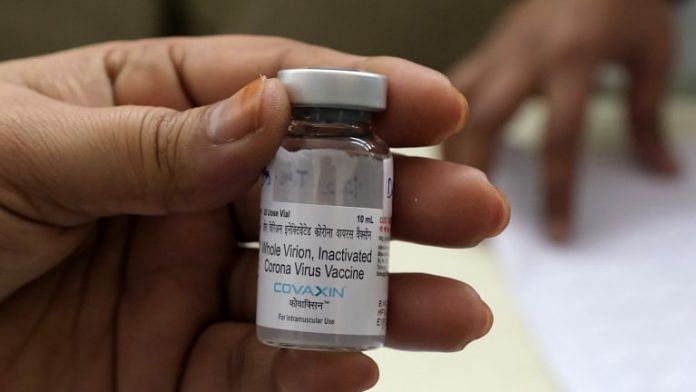New Delhi: Bharat Biotech and Indian Council of Medical Research’s (ICMR) Covid vaccine Covaxin offers significant protection against both Beta and Delta variants of the SARS-CoV-2 virus, a new study has found.
Delta (B.1.617.2) and Beta (B.1.351) variants of SARS-CoV-2 have been a global health concern due to their impact on existing vaccines. Several scientists have reported that both variants are associated with higher transmissibility and potential immune escape properties.
In a study published in the Journal of Travel Medicine, researchers from ICMR and Bharat Biotech assessed blood samples from people who had recovered from Covid-19 as well as those who had received Covaxin.
The team looked at the ability of these blood samples to neutralise the Beta and Delta variants. The study found that the vaccine conferred significant protection against both variants.
According to the team, the immune escape of Beta and Delta variants has been a serious concern for the Covid-19 vaccination programme, since it has shown reduced neutralisation to several approved vaccines such as Moderna’s mRNA1273, Pfizer’s BNT162b2, and Covishield (ChAdOx1).
Neutralisation potential of Covaxin has been already studied by the team with the Alpha (B.1.1.7), Zeta ( B.1.1.28 or P.2), and Kappa ( B.1.617.1) variants. The vaccine was found to be effective against these variants.
Also read: Not just vaccine, even monkeys used in Covaxin trial were ‘made in India’
How the study was conducted
In the new study, the team assessed the neutralisation of blood samples from 20 people who had recovered from Covid, between 5 to 20 weeks after infection. In addition, blood samples from 17 vaccine recipients collected 28 days after two doses of Covaxin were also assessed against Beta and Delta variants.
Among the recovered cases, three were infected with the Kappa lineage, while 17 were infected with B.1 variant — one of the first variants identified.
The team conducted what is known as the plaque reduction neutralization test, which is used to quantify the concentration of neutralising antibodies for a virus.
In this test, the blood serum sample is diluted and mixed with a viral suspension. The mixture is then left undisturbed to allow the antibody to react with the virus.
This is then poured over a layer of host cells, usually in a petri dish. The surface of the cell layer is covered in a layer of a jelly-like substance called agar to prevent the virus from spreading.
The researchers estimate the regions of infected cells — called plaques — formed after a few days. This can be done either using microscopic observation or specific dyes that react with infected cells.
The concentration of serum to reduce the number of plaques by 50 per cent gives the measure of how much antibody is present or how effective it is.
This measurement is denoted as the PRNT50 value.
Neutralisation efficacy
The study did not involve clinical trials to test the efficacy of the vaccine against the emerging variants.
The team found a significant reduction in the neutralisation efficacy for Beta and Delta variants in comparison to B.1.
However, the team reported that despite this reduction, the vaccine had sufficient neutralisation potential to be effective against the variants.
The team also said that since inactivated vaccine induces immune response against whole virion — instead of targeting just the spike protein like the mRNA vaccines — the mutations in the spike protein do not cause a reduction in the neutralisation ability to the same extent as some of the other vaccines.
Also read: Complex manufacturing, R&D, risks, losses — Bharat Biotech explains why Covaxin is expensive



